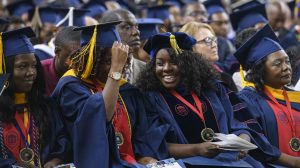
UM students participate in the CICCE’s Celebration of Achievement, a graduation ceremony for students from historically underrepresented populations. Photo by Thomas Graning/Ole Miss Communications
OXFORD, Miss. – During their college careers, many students find an organization, resource or mentor that influences the person they become and affects them both academically and personally. For several of this year’s graduates, the University of Mississippi’s Center for Inclusion and Cross Cultural Engagement served as all three.
The CICCE was established in 2014 to provide services that foster an inclusive campus environment. The students graduating this year were freshmen when the center first opened, and it became a haven to them for mentorships and conversations.
“The class of 2018 is especially special to me, as many of the undergraduates were only freshmen when the CICCE opened during the fall 2014 semester,” said Shawnboda Mead, the center’s director. “Four years later, the center has contributed to the university’s commitment to diversity, equity and inclusion, yet I know there is still more work to be done.
“My hope is that with each class, we will continue to see progress towards making the university a more welcoming place for all students.”
The center’s mission is to create open and continuous communication to deepen the understanding of self-identity and the identity, culture and heritage of others for all students. The center’s staff also works to create a space that is nurturing and welcoming for students from historically underrepresented groups.
Over the last four years, the center has assisted with growth and retention of underrepresented students. In 2016, UM’s retention rate for African-American students was more than 85 percent. This rate was the highest among institutions in Mississippi and higher than the Southern University Group average.
The center also has developed programs and leadership initiatives for underrepresented students and hosted events to promote cross-cultural interactions among the entire student population. Among the most successful of those programs is the Mississippi Outreach to Scholastic Talent Mentoring program, a partnership with the Office of Admissions that pairs incoming freshman and high school seniors of color with an upperclassman mentor.
The annual MOST Conference, held each summer for high school seniors, aims to expose prospective African-American students to academic offerings, campus resources and leadership opportunities. The conference has grown each year, and more than 850 students have applied for this year’s event, scheduled for July.

Terrence Johnson graduates with a degree in journalism from the Meek School of Journalism and New Media. Photo by Thomas Graning/Ole Miss Communication
Of students attending MOST in 2015 and 2016, about 30 percent enrolled at Ole Miss.
Hundreds of students have volunteered to serve as mentors in MOST, as well as other leadership programs including UM CONNECT, which matches African-American, Latin American, Native American, Asian-American, multiracial and first-generation college students with a mentor.
The African American Males Enrolling Retaining Graduating Initiative provides mentoring, community outreach, and personal and professional development opportunities for students. The Inclusion Team of Peer Diversity Educators allows any student to volunteer as an advocate for diversity, multiculturalism and social justice.
“The participation of students has been instrumental in allowing our small staff to expand our reach across the campus and fulfilling our mission,” Mead said.
The CICCE, in collaboration with campus partners, also hosted a Lavender Graduation for the last three years to celebrate the achievements of LGBTQ students. The center also develops programs for Black History Month, Women’s History Month, Hispanic Heritage Month, LGBT History Month and Native American Heritage Month, among other celebrations.
Students who entered the university during the center’s inaugural year have directly benefitted from those services during their time at Ole Miss.
Terrence Johnson, broadcast journalism major and African American studies minor from Shuqualak, said the center eased his transition into university life and allowed him to participate as a MOST mentor.
“The center was the first place that I was able to call home,” he said. “It was one of the best things that happened to me because it gave me the privilege to invest in students like I had been invested in.
“I know that through this position, it led to other opportunities on campus that really solidified my undergrad experience. I am so thankful for the center and everyone who’s a part of being a change agent for our campus. The center changed me.”
Nekkita Beans, social work major from Philadelphia and outgoing president of the Black Student Union, said the center was the backbone of her UM experience.
“As a freshman, I struggled to find my footing as a black student who attended a predominantly white high school and now a predominantly white institution,” she said. “I did not know what it meant to be too black or not black enough.”
That year, the CICCE took a group of students to the National Civil Rights Museum in Memphis, which filled Beans with many different emotions: rage, happiness, sadness and pride. After the trip, Mead and Melinda Sutton Noss, assistant vice chancellor for student affairs, sat down with students to discuss their experiences over dinner.
“The center has always had a way of bringing upper-level school administrators down to the table with students,” Beans said. “That is something that I have always admired about that place.
“With my newly found black pride in tow, I boldly marched into sophomore year more comfortable and confident than the previous year.”
Beans also developed a home at the center, where she had daily conversations about race, pop culture, campus climate and current events. She said these conversations allowed her to learn much more beyond the classroom.

Caitlynn Hamilton, a 2018 UM graduate, credits the CICCE with teaching her best practices for inclusion. Photo by Thomas Graning/Ole Miss Communications
“One of the biggest lessons that I have come to learn through the CICCE is the importance of intersectionality,” she said. “The center is a place where all aspects of identity is explored.
“Having this space equipped me with the confidence and tools that I needed to address injustice, inequality and ignorance within my community and on campus.”
The CICCE serves as the advising office for the Black Student Union. This is just one way the university has shown that it values and respects students of color, Beans said.
“We are able to mentor other students of color as they enter and matriculate at the University of Mississippi,” she said. “This shows that the University of Mississippi is willing to truly invest in the success of its students. I have no doubt that this is the direct result of the CICCE.”
Besides providing resources to underrepresented students, the center also has shaped the way students view peers of different backgrounds.
For Caitlynn Hamilton, a general studies major from Hernando, the center was a turning point in understanding her own privilege and the lack of opportunity for underrepresented populations.
“Being a part of the iTeam has allowed me to learn many different strategies for best practicing inclusion, but also how to break those ideas down for the students we present to,” she said.
Being involved with the center shaped Hamilton into a person who cares about students on a deeper level and has led her to pursue a career as a student affairs professional, she said.
“I think the center’s impact in my life is reflected in my friend group as well, considering not a single one of them is just like me,” Hamilton said. “I have found comfort in being uncomfortable at this university, because of the center’s work in challenging me to find differences and embrace them.”
For more information about the center and its resources, visit https://inclusion.olemiss.edu.